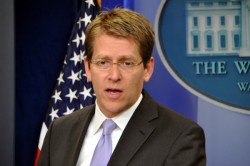National
White House mum on Kameny’s death
Obama had previously recognized activist’s work

White House Press Secretary Jay Carney said Friday he didn’t have an immediate reaction to the passing of gay rights pioneer Frank Kameny — although he said he was aware of the activist’s death.
Asked by the Washington Blade for a response to the pioneering activist’s death last week, Carney replied, “I’ll have to take that. … I know that he passed away, but I don’t have a comment on that.”
The Blade has been seeking comment from the White House on Kameny’s passing since his death last week. However, the White House hasn’t responded to the inquiries.
Asked why a White House statement on Kameny wasn’t issued upon his death, Carney replied, “I don’t know, so I’ll have to take the question.”
Carney similarly dodged when asked if President Obama would be open to attending a public viewing for Kameny on Nov. 3. The “farewell viewing” is scheduled to take place at the Carnegie Library and civic leaders are expected to speak.
Asked if Obama would be open to attending the service, Carney replied, “I’m not his scheduler.”
The White House’s silence on Kameny’s death raises questions because Obama is familiar with the activist’s work and included him at events where the administration has advanced LGBT causes.
In 2009, Kameny appeared in a photo-op and on camera with Obama when he signed a memorandum to extend benefits to the same-sex partners of federal employees. In December, Kameny was invited and present during the signing of legislation to repeal “Don’t Ask, Don’t Tell.”
In 2009, Obama noted Kameny’s presence at the White House reception commemorating June as Pride month and called Kameny a “civil rights pioneer.”
“Frank was fired from his job as an astronomer for the federal government simply because he was gay,” Obama said. “And in 1965, he led a protest outside the White House, which was at the time both an act of conscience but also an act of extraordinary courage. And so we are proud of you, Frank, and we are grateful to you for your leadership.”
Upon Kameny’s death last week, John Berry, director of the U.S. Office of Personnel Management, issued a statement, and subsequently wrote an op-ed for the Blade in tribute to Kameny. But no statement has come directly from the White House.
“Dr. Frank Kameny was an American hero who transformed our nation’s lesbian, gay, bisexual and transgender community,” Berry said. “His courage, his brilliance, his force of will led to victory in a decades-long fight for equality. He helped make it possible for countless of patriotic Americans to hold security clearances and high government positions, including me. And in so doing, he showed everyone what was possible for every employer in our country.”
It isn’t unusual for the White House or President Obama to comment on news events relevant to the LGBT community.
When certification of “Don’t Ask, Don’t Tell” repeal happened in July, President Obama, Defense Secretary Leon Panetta and Chairman of the Joint Chiefs of Staff Adm. Mike Mullen each issued statements observing the importance of the event.
A transcript of the exchange between the Blade and Carney follows:
Washington Blade: Jay, last week, gay rights pioneer Frank Kameny died at the age 86. After being fired from his government job in the 1950s for being gay, he became a leader in the gay rights movement before the Stonewall riots of 1969 and many years afterwards. What reaction does the White House have to his passing?
Jay Carney: I’ll have to take that. I’m not aware of — I mean, I know that he passed away, but I don’t have a comment on that.
Blade: Can you tell me why the White House didn’t put out a statement last week upon his death?
Carney: I don’t know, so I’ll have to take the question.
Blade: Just one last question, there’s going to be a public viewing of Kameny on Nov. 3 at the Smithsonian and civic leaders are to expected to speak. Would the president be open to attending this ceremony?
Carney: I’m not his scheduler.
U.S. Supreme Court
Supreme Court to consider bans on trans athletes in school sports
27 states have passed laws limiting participation in athletics programs

The U.S. Supreme Court on Thursday agreed to hear two cases involving transgender youth challenging bans prohibiting them from participating in school sports.
In Little v. Hecox, plaintiffs represented by the ACLU, Legal Voice, and the law firm Cooley are challenging Idaho’s 2020 ban, which requires sex testing to adjudicate questions of an athlete’s eligibility.
The 9th U.S. Circuit Court of Appeals described the process in a 2023 decision halting the policy’s enforcement pending an outcome in the litigation. The “sex dispute verification process, whereby any individual can ‘dispute’ the sex of any female student athlete in the state of Idaho,” the court wrote, would “require her to undergo intrusive medical procedures to verify her sex, including gynecological exams.”
In West Virginia v. B.P.J., Lambda Legal, the ACLU, the ACLU of West Virginia, and Cooley are representing a trans middle school student challenging the Mountain State’s 2021 ban on trans athletes.
The plaintiff was participating in cross country when the law was passed, taking puberty blockers that would have significantly reduced the chances that she could have a physiological advantage over cisgender peers.
“Like any other educational program, school athletic programs should be accessible for everyone regardless of their sex or transgender status,” said Joshua Block, senior counsel for the ACLU’s LGBTQ and HIV Project. “Trans kids play sports for the same reasons their peers do — to learn perseverance, dedication, teamwork, and to simply have fun with their friends,” Block said.
He added, “Categorically excluding kids from school sports just because they are transgender will only make our schools less safe and more hurtful places for all youth. We believe the lower courts were right to block these discriminatory laws, and we will continue to defend the freedom of all kids to play.”
“Our client just wants to play sports with her friends and peers,” said Lambda Legal Senior Counsel Tara Borelli. “Everyone understands the value of participating in team athletics, for fitness, leadership, socialization, and myriad other benefits.”
Borelli continued, “The U.S. Court of Appeals for the Fourth Circuit last April issued a thoughtful and thorough ruling allowing B.P.J. to continue participating in track events. That well-reasoned decision should stand the test of time, and we stand ready to defend it.”
Shortly after taking control of both legislative chambers, Republican members of Congress tried — unsuccessfully — to pass a national ban like those now enforced in 27 states since 2020.
Federal Government
UPenn erases Lia Thomas’s records as part of settlement with White House
University agreed to ban trans women from women’s sports teams

In a settlement with the Trump-Vance administration announced on Tuesday, the University of Pennsylvania will ban transgender athletes from competing and erase swimming records set by transgender former student Lia Thomas.
The U.S. Department of Education’s Office for Civil Rights found the university in violation of Title IX, the federal rights law barring sex based discrimination in educational institutions, by “permitting males to compete in women’s intercollegiate athletics and to occupy women-only intimate facilities.”
The statement issued by University of Pennsylvania President J. Larry Jameson highlighted how the law’s interpretation was changed substantially under President Donald Trump’s second term.
“The Department of Education OCR investigated the participation of one transgender athlete on the women’s swimming team three years ago, during the 2021-2022 swim season,” he wrote. “At that time, Penn was in compliance with NCAA eligibility rules and Title IX as then interpreted.”
Jameson continued, “Penn has always followed — and continues to follow — Title IX and the applicable policy of the NCAA regarding transgender athletes. NCAA eligibility rules changed in February 2025 with Executive Orders 14168 and 14201 and Penn will continue to adhere to these new rules.”
Writing that “we acknowledge that some student-athletes were disadvantaged by these rules” in place while Thomas was allowed to compete, the university president added, “We recognize this and will apologize to those who experienced a competitive disadvantage or experienced anxiety because of the policies in effect at the time.”
“Today’s resolution agreement with UPenn is yet another example of the Trump effect in action,” Education Secretary Linda McMahon said in a statement. “Thanks to the leadership of President Trump, UPenn has agreed both to apologize for its past Title IX violations and to ensure that women’s sports are protected at the university for future generations of female athletes.”
Under former President Joe Biden, the department’s Office of Civil Rights sought to protect against anti-LGBTQ discrimination in education, bringing investigations and enforcement actions in cases where school officials might, for example, require trans students to use restrooms and facilities consistent with their birth sex or fail to respond to peer harassment over their gender identity.
Much of the legal reasoning behind the Biden-Harris administration’s positions extended from the 2020 U.S. Supreme Court case Bostock v. Clayton County, which found that sex-based discrimination includes that which is based on sexual orientation or gender identity under Title VII rules covering employment practices.
The Trump-Vance administration last week put the state of California on notice that its trans athlete policies were, or once were, in violation of Title IX, which comes amid the ongoing battle with Maine over the same issue.
New York
Two teens shot steps from Stonewall Inn after NYC Pride parade
One of the victims remains in critical condition

On Sunday night, following the annual NYC Pride March, two girls were shot in Sheridan Square, feet away from the historic Stonewall Inn.
According to an NYPD report, the two girls, aged 16 and 17, were shot around 10:15 p.m. as Pride festivities began to wind down. The 16-year-old was struck in the head and, according to police sources, is said to be in critical condition, while the 17-year-old was said to be in stable condition.
The Washington Blade confirmed with the NYPD the details from the police reports and learned no arrests had been made as of noon Monday.
The shooting took place in the Greenwich Village neighborhood of Manhattan, mere feet away from the most famous gay bar in the city — if not the world — the Stonewall Inn. Earlier that day, hundreds of thousands of people marched down Christopher Street to celebrate 55 years of LGBTQ people standing up for their rights.
In June 1969, after police raided the Stonewall Inn, members of the LGBTQ community pushed back, sparking what became known as the Stonewall riots. Over the course of two days, LGBTQ New Yorkers protested the discriminatory policing of queer spaces across the city and mobilized to speak out — and throw bottles if need be — at officers attempting to suppress their existence.
The following year, LGBTQ people returned to the Stonewall Inn and marched through the same streets where queer New Yorkers had been arrested, marking the first “Gay Pride March” in history and declaring that LGBTQ people were not going anywhere.
New York State Assemblywoman Deborah Glick, whose district includes Greenwich Village, took to social media to comment on the shooting.
“After decades of peaceful Pride celebrations — this year gun fire and two people shot near the Stonewall Inn is a reminder that gun violence is everywhere,” the lesbian lawmaker said on X. “Guns are a problem despite the NRA BS.”





















